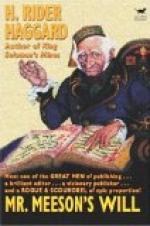Mr. Meeson gazed round him. He looked at the long array of glass and silver, at the spotless napery and costly flowers. He looked at the walls hung with works of art, which, whatever else they might be, were at least expensive; at the mirrors and the soft wax-lights; at the marble mantelpieces and the bright warm fires (for it was November); at the rich wall paper and the soft, deep-hued carpet; and reflected that they were all his. And then he sighed, and his coarse, heavy face sank in and grew sad. Of what use was this last extremity of luxury to him? He had nobody to leave it to, and to speak the truth, it gave him but little pleasure. Such pleasure as he had in life was derived from making money, not from spending it. The only times when he was really happy were when he was in his counting house directing the enterprises of his vast establishment, and adding sovereign by sovereign to his enormous accumulations. That had been his one joy for forty years, and it was still his joy.
And then he fell to thinking of his nephew, the only son of his brother, whom he had once loved, before he lost himself in publishing books and making money, and sighed. He had been attached to the lad in his own coarse way, and it was a blow to him to cut himself loose from him. But Eustace had defied him, and—what was worse—he had told him the truth, which he, of all men, could not bear. He had said that his system of trade was dishonest, that he took more than his due, and it was so. He knew it; but he could not tolerate that it should be told him, and that his whole life should thereby be discredited, and even his accumulated gold tarnished—stamped as ill-gotten; least of all could he bear it from his dependent. He was not altogether a bad man; nobody is; he was only a coarse, vulgar tradesman, hardened and defiled by a long career of sharp dealing. At the bottom, he had his feelings like other men, but he could not tolerate exposure or even contradiction; therefore he had revenged himself. And yet, as he sat there, in solitary glory, he realized that to revenge does not bring happiness, and could even find it in his heart to envy the steadfast honesty that had defied him at the cost of his own ruin.
Not that he meant to relent or alter his determination. Mr. Meeson never relented, and never changed his mind. Had he done so he would not at that moment have been the master of two millions of money.
CHAPTER III.
AUGUSTA’S LITTLE SISTER.
When Augusta left Meeson’s she was in a very sad condition of mind, to explain which it will be necessary to say a word or two about that young lady’s previous history. Her father had been a clergyman, and, like most clergymen, not overburdened with the good things of this world. When Mr. Smithers—or, rather, the Rev. James Smithers—had died, he left behind him a widow and two children—Augusta, aged fourteen, and Jeannie, aged two. There had




